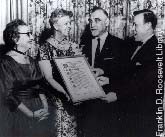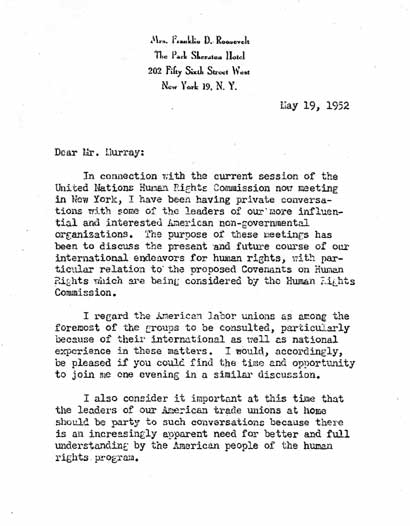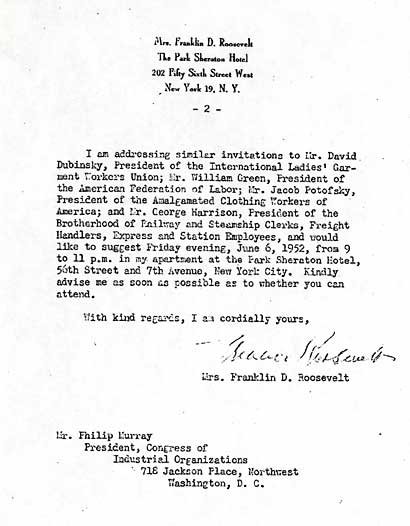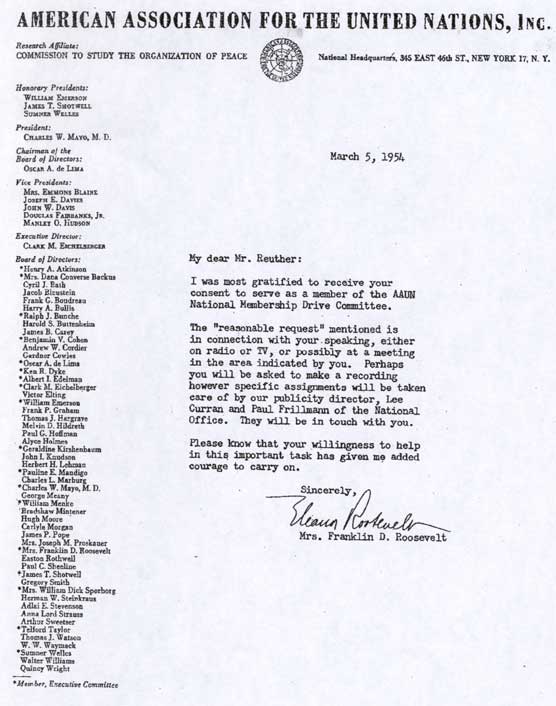 |
 |
| ER with Bessie Hillman and Jacob Potofsky, ACWA, and
Walter Reuther, UAW, 1957. (9) |
|
|
Eleanor Roosevelt continued her work in support
of the United Nations and the Universal Declaration of Human
Rights until her death. She considered American labor unions
a critical base of support not only to insure that workers'
rights were included as human rights, but also to educate
the American people about all human rights and the role of
the
United Nations in protecting those rights. She worked with
unions in several ways. For example:
- She convened meetings of labor leaders to seek
their advice as shown in the following letter to Philip
Murray, President of the Congress of Industrial Organizations
(CIO). (10)


- She regularly spoke before union conventions. For an example
of ER's commitment to workers' and human rights, and the
UN, see her 1956 address to the Amalgamated Clothing Workers
of America
(ACWA), excerpted
below. (11)
EXCERPT, ACWA CONVENTION SPEECH, March 21-25,
1956
I want you to realize that what you invest in
the United Nations and in foreign aid is not a loss. It is
an investment, which will bring you returns in a prosperous
country in which we hope our children will grow up to have
better standards of living, even, than we have today, and we
have better standards of living than almost any other country
in the world…
I think the United Nations is important, because
it will remind us constantly, through our delegates there and
their contacts, that our leadership must be leadership that
speaks for actual accomplishment in our own country. That is
why it is important that we move with knowledge and understanding,
but with determination and calmness, towards achieving equality
for every American citizen…
An curiously enough, that is why, to me, the
union movement is tremendously important. Of course, you in
the unions, do not yet represent all of labor. But I hope some
day you will, because I believe that it is through strength,
through the fact that people who know what people need are
working to make this country a better place for all people,
that we will help the world to accept our leadership and understand
that, under our form of government and through our way of life,
we have something to offer them which cannot be offered by
the communists…
I humbly hope that you will have courage, that
you will develop vision, and that you will think first of what
you can do in this country and then of what you can do in the
world. The two are tied together, and I wish you blessing in
all you do.
- When Eisenhower refused to reappoint ER to the 1953 American
delegation to the United Nations, ER devoted her considerable
energy to the American Association for the United Nations,
where she made sure that union leaders were involved in carrying
the human rights message to American workers. For example,
see the following letter to Walter Reuther, President
of
the United
Automobile
Workers
(UAW).
(12)

- And she took her message directly to the rank-and-file
union members and their families. For example, the AFL-CIO
reported
on her work with the sons and daughters of union members
of Local 1199 Retail Drug Employees in 1957.
"Soon after, a group met at Queens College
to hear Mrs. Alma John and Mrs. Eleanor Roosevelt speak on
the United
Nations. Next they went to the radio station to have their
own discussion. This round table was so [successful] that the
station has since decided to put on the 'Teen-agers Look
at the UN' show." (13)
- In 1961, John F. Kennedy asked ER to chair the first President's
Commission on the Status of Women. She ended her public life
as she began it, working with union women on issues of justice
and equality. During her last
appearance at an AFL-CIO convention that
year, Eleanor Roosevelt admonished the labor movement to
live up to its high ideals:
"I think that it is
part of our job to keep alive the ideals that you started with,
the ideals
of really helping the people to better conditions to a better
way of life, which is part of the basis of democracy…I
hope that we are going to continue to make of our movement
the star in our country that leads the way." (14)
To view all footnotes, click here. |
|

